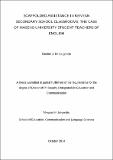Scaffolded assistance in Kenyan secondary school classrooms :the case of Maseno University student teachers of English
Abstract/
he thesis furthers understanding of sociocultural perspectives on teaching and learning by investigating the process of scaffolding in whole class interactions among pre-service teachers of English in the Kenyan secondary school context. While the linguistic features of scaffolding have been previously investigated, the research, most commonly undertaken in Western contexts such as Europe or North America, often assumes the availability of physical tools and artefacts, technological equipment and class sizes more commonly found in such contexts. This study provides insight into the linguistic features of scaffolding in a non-Western context where such resources are uncommonly available to teachers working with much larger classes. Further, this thesis provides insight into some of the factors limiting the practice of scaffolding as a social process of teaching English and proposes some ways of improving the use of scaffolding in terms of the pedagogy of teaching English in the Kenyan context. A qualitative embedded case study design was employed using the case of Maseno University student teachers of English, during their teaching practicum in schools. Research data comprised of: 17 video-recorded English lessons; a selection of Maseno University teacher education documents relevant to the student teachers’ education; and an interview with a Maseno University English teaching lecturer. A microanalysis of teacher discourse moves in 11 interactive episodes, labelled as learner-centred were compared with examples of the far more commonly found teacher-led episodes to reveal and understand the scaffolding strategies used by student teachers to assist learner’s learning of English. A sociocultural analysis of Kenyan secondary school classroom environments, together with a content analysis of the course documents and key themes identified in the interview provided information on the background factors affecting the manner in which scaffolding is practiced in Kenyan classrooms. The findings show that scaffolded assistance in the Kenyan context is characteristically achieved by teacher-learner interactions in whole-class activity. The learner-centred episodes revealed that in response to learner needs, student teachers guide interactions and create dialogic spaces for learner participation in joint and productive problem solving by contingently using discourse strategies. The discoursal strategies found fall under five key mechanisms of assistance namely: collaboration, modelling, questioning, feedback and instructing. Challenges such as: the culture of teaching and learning in Kenya; an incoherence iii between the teacher education syllabi and the prescribed syllabus for learning English in secondary schools; large class sizes and the scarcity of teaching resources were found to have a genuine impact on the use of pedagogical approaches encouraging learner-centred scaffolding. Moreover, student teachers’ understanding of the practice of scaffolding as a process of teaching was also hindered by the lack of theoretical or pedagogical foundation work in relation to a sociocultural approach to learning in the language teacher education curriculum. The findings imply a relationship between the education culture and language as mediational tools in different contexts and therefore the need for a context driven approach to the adoption and application of sociocultural theory in different teaching and learning contexts. Furthermore, it suggests that employing a sociocultural perspective to guide the policy and practice of teacher education could support improved quality in the teaching of English in Kenya. This thesis also presents ways forward for this complex task in educational contexts with large classes, limited physical resources, and a prescribed curriculum, such as Kenya.

